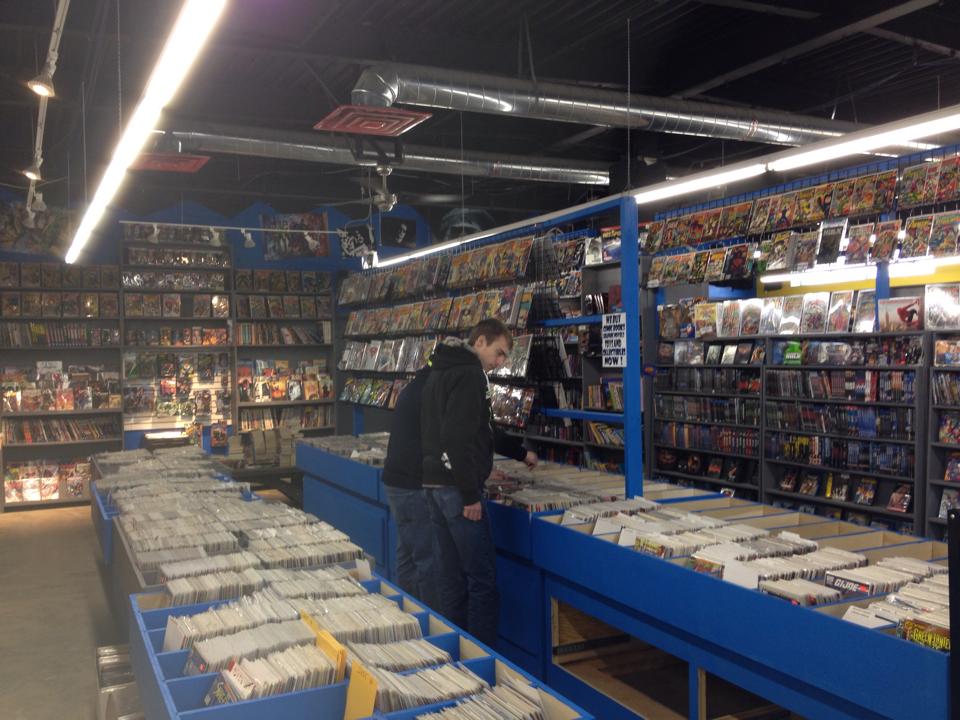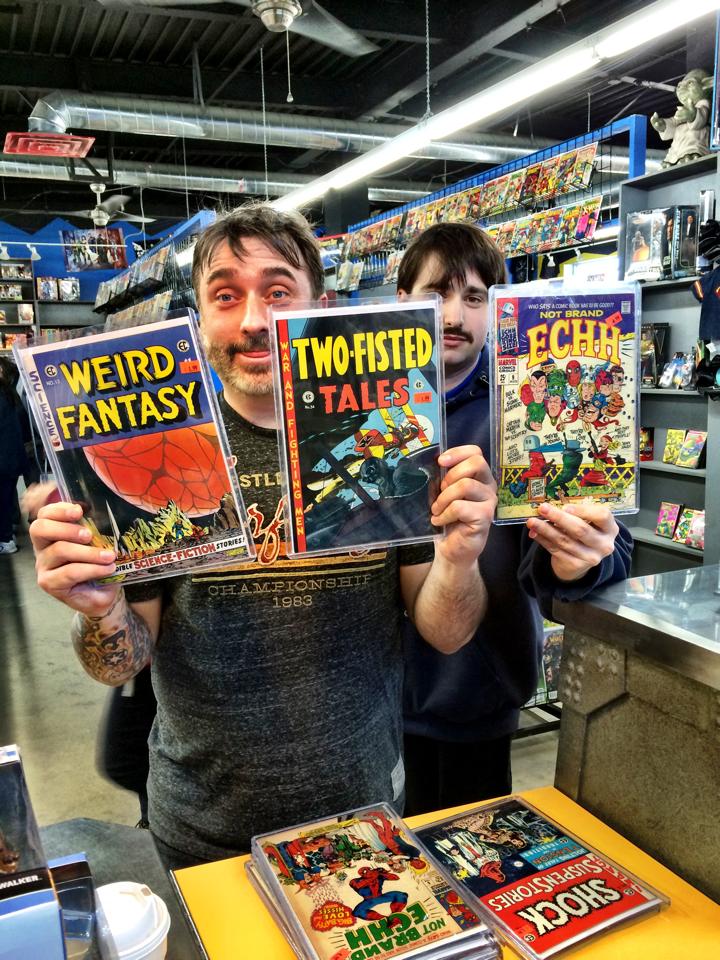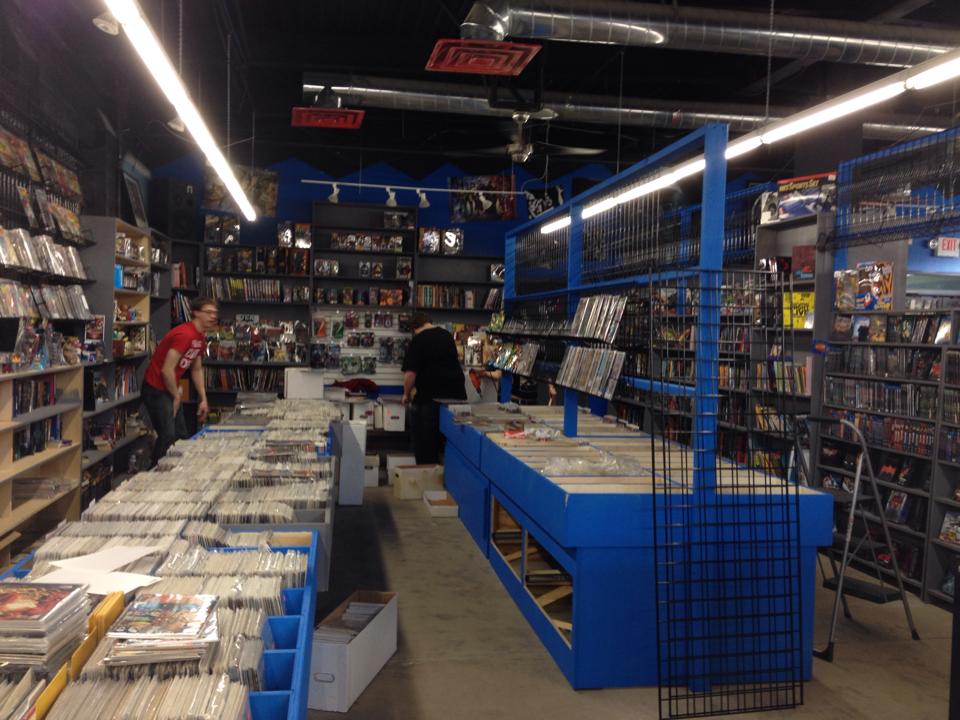
Cross will knock down walls and move his office, storage, shipping and receiving space offsite in order to expand the already-significant comics presence in his store. His plan, aside from bringing in new, monthly periodical comics starting in January 2015, is to hold signings and other events monthly, starting in January when he celebrates his Grand Opening with a signing appearance by Batman Eternal and The Death of Wolverine: The Logan Legacy writer James Tynion IV.
Videos by ComicBook.com
The retailer has been selling graphic novels for years, starting with a small selection and expanding steadily, but in March they took the plunge into back issues. Sound Go Round has been doing a brisk trade in everything from common ’90s dollar-bin titles to Golden and Silver Age classics they get CGC-graded and sell both in-store and online via eBay and Amazon.
The decision to move into monthly comics is one that Cross is taking seriously; he plans to leverage the significant revenue provided by music, movie and video game sales — as well as the strong margins provided by reselling comics that come in through the store’s buy/sell/trade program — to buy a wider variety, and more independent books, than any store in his geographical area.

So, you’ve got a successful store going here. Why comics?
Customers who come in here like what comics have to offer. There are guys who come in here who are into Game of Thrones and there are going to be comics that they would enjoy. People that are into Spider-Man movies or even guys that are into music — I think it’s all related.
So you think media in general is getting to be a more interconnected beast?
Yeah, well Gerard Way won an Eisner, right? The guy from Coheed writes a little, too.
What made you evolve from a rack of graphic novels three years ago, to sixty square feet of back issues now, to “We’re opening a comic shop in the record store?”
How’d I come to that? Well, a lot of different things. One, we were financially ready to start doing it and then all the movie announcements for the next ten years — we thought it would be a good thing to get into.
And people were just asking for it. Everything with my store, I’ve always started because I was unsatisfied with other businesses. I opened up the record store because I wished my record store was like this, I wished my video game store sold this. I’m always like, “I wish we had a comic book store like this.” So I keep on just doing things that I think people will be happy with.
And does the nature of your store allow you to absorb the hit of being a new comic store and perhaps trying to figure out what works?
Yeah, a little bit. We’re actually talking about a pull list and not making a lot of money — giving a lot of stuff away, like every fifth one is free, that kind of thing. We just want people to have fun and have a good experience. We don’t really need to make a lot to get buy. We actually make a lot on the back issues and the graphic novels so we don’t need to make a lot on the newer stuff.
Can you tell me a little about your philosophy on the indie stuff?
We really want to focus on quality, not necessarily just the brand name. We want to get really quality writers and artists, support them and maybe get them in here to sign stuff.
My favorite part of the business is when a customer experiences something new. You know– “I never heard of that, I got it here.” So that’s kind of what we want to do. It’s not so much to become big but to offer things that nobody else does.
Is there any fear that if you do this and nobody comes, you’re stuck with all this non-returnable stuff?
No, I’m not afraid of it. I think a lot of specialty shops, comic book shops and stuff like that, they’re really into it becuase they are into it themselves. They’re very opinionated about what they like, what they don’t like. We’re in business to make people happy.
It’s different than, “I’m into music so I stock up on hard rock because that’s what I like.” We really are in touch with people and I think we’ll be okay because we’ll feel out what they like and what they want and we’ll make adjustments. We don’t want things to get stale. Every six months, we’re building something or moving stuff around.

Yeah — we’re actually renting spaces and moving our offices and supplies and stuff to other buildings to take out this [room] and make more room for the comics.
Was that something you knew you’d have to do before you started your first order?
No, it’s just something that we figured, if we’re going to do something we’ve got to do it the biggest, the best. Who else in town will have 100,000 comics in a year? That’s something worth striving for.
There are a lot of comic book stores within about a 20-mile radius but nobody with the size and nobody who buys as aggressively as Sound Go Round. Is being a destination for back issues a big part of your strategy?
Yeah. We don’t want to get ahead of ourselves, but eventually we’ll get to the point where we’re being even more aggressive about seeking stuff out. We don’t have a shortage — people walk in every five minutes with a box of something. We just keep on buying as much as we can.
Editor’s Note: As many of our readers know, since local locations have appeared on the site before, Senior Staff Writer Russ Burlingame lives and works in the Binghamton, New York area.
Update: On August 18, a couple of days after the Sound Go Round announcement hit, members of the local comics retail community were apparently upset by the piece. We’ve had a couple of readers who are friends of area comic shops write in to say, “a few of the claims about other shops in the area and their inventory of older comics and the amount of older issues they go after could probably be amended as it isn’t actually accurate.”
We tweaked the language of one question that previously referred to the shop as the only retailer in town that active courts older titles for clarity.








